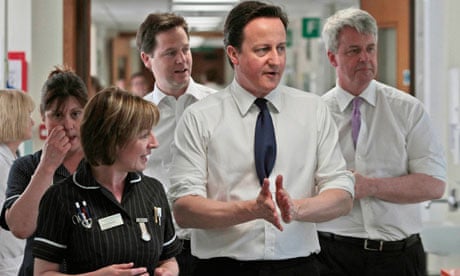After the so-called "listening exercise" many commentators are talking about a humiliating U-turn by the government over the NHS "reforms" and claiming there have been significant changes to Andrew Lansley's health and social care bill. But they are the victims of a massive PR coup by the government, which must be delighted with its strategy.
A well-orchestrated political storm greeted the report of the Future Forum, with Liberal Democrats claiming they had ticked nearly all their boxes and Conservative backbenchers complaining that the "reforms" had been betrayed by their coalition partners. Even Alan Milburn was dusted off to say that the "reforms" were now a "car crash" as a result of being watered down too much.
But, if you had listened carefully while all this was going on, you would have heard Lansley reassuring his backbenchers that the core principles of the bill remained in place and that no red lines had been crossed, and he was quite right. Very little of significance had changed and the bill is still on course to achieve its underlying intention, accelerating the privatisation of the health service, turning the NHS into a kitemark attached to a ragbag of competing and largely private providers.
All the mechanisms to do this are still in place. Private companies can still be involved in commissioning NHS services and these services will still be delivered by any "qualified" provider. Thus the commercial sector can still hold the budget and provide the care. Competition, the aspect of the reforms that most worries doctors, emerges almost intact.
The rhetoric has been toned down and been rebranded as "choice". However, the code of practice that governs it will be put on a statutory footing, and the responsibility for ensuring that competition trumps other considerations is passed to the Orwellian Co-operation and Competition Panel. They move into Monitor, so claims that Monitor is no longer concerned with competition are premature, if not misleading.
Foundation trust timetables have been relaxed but there is still no cap on their private income, meaning that many will be tempted to boost their dwindling resources by increasing private patient numbers, inevitably at the expense of NHS patients. The secretary of state's "duty to provide" comprehensive health care is now so obscure that teams of lawyers are working their way through the legalese in an attempt to understand it. If this is meant to be straightforward, why not return to the original wording? Worrying evidence is also emerging that the bill will specifically make provision for private equity companies to buy NHS facilities and asset strip them. Is this really what David Cameron intended when he claimed that he loved the NHS?
One of the selling points of the original white paper was a 45% reduction in NHS bureaucracy. Now the Royal College of GPs has warned MPs that the number of statutory NHS organisations is set to increase from 163 to 521. These include the National Commissioning Board, clusters of strategic health authorities and primary care trusts, clinical senates, health and wellbeing boards and the GP consortiums themselves, not to mention whatever is left of the Department of Health. GPs feel that, far from moving towards a commissioning nirvana where they can improve care for their patients, they face a commissioning nightmare where they will be responsible for cuts and subject to enforced competition. They also foresee the end of their independent contractor status, as they become subordinate to commercial primary care organisations. No wonder most GPs feel they aren't ready for the commissioning role, that it will damage doctor-patient relationships and that the NHS will be harmed.
Rather than improving the situation, the Future Forum has done the inconceivable and made matters worse. The few supporters of the original bill are now backing away, alarmed by its increasing incoherence. The BMA has twice voted for the bill to be scrapped, and a British Medical Journal poll this week showed 93% calling for its withdrawal. Today the heart tsar, Sir Roger Boyle, resigned, saying: "I feel in my bones the current changes are not correct and ministers were not prepared to change them substantially." How much more proof is needed that nothing significant has changed? The BMJ christened the bill "Lansley's monster" when it first appeared. The politicians took it away, slapped on some lipstick and asked us to embrace it. A monster with lipstick is still a monster. It needs to be terminated with extreme prejudice.
